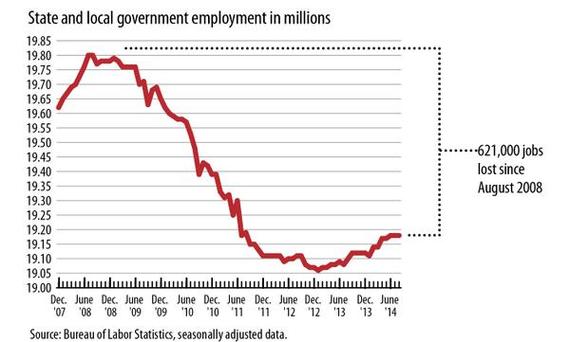Today's job numbers were ok, but not as good as expected. The economy has been on a little bit of a roll, having added more than 200,000 jobs each of the last seven months. In fact, if you look at 14 years of employment statistics, as Justin Wolfers at the University of Michigan has done, the last couple of years have been the best for job growth in that generation. So, things are good, right?
Maybe. Employment numbers fluctuate a lot month to month, so one month is hard to judge. August came in worse than expected, but still positive, at a gain of 142,000 jobs. But because the numbers didn't meet expectations, it has brought a lot of hand-wringing from economic experts.
But maybe it's worth asking if the numbers aren't the problem. Maybe the main problem in the U.S. economy at the moment is not structural, but psychological. Maybe America's got the blues, and that pessimism is keeping us down.
Economists are renowned for having three hands, which is a play on the idea that they like to say on one hand the facts say X, on the other, they say Y, which is contradictory. So let's play a little three-handed poker.
On one hand, as Wolfers points out, payroll growth (the number of employed Americans) has been growing rapidly.
Average monthly payrolls growth:
- 2001-2008 +21k
- 2009 -424k
- 2010 88k
- 2011 174k
- 2012 186k
- 2013 194k
- 2014 215k
On the other hand, as Ben Casselman at FiveThirtyEight points out, the number of Americans leaving the job market has been larger than the number of new employees for 49 of the last 50 months. That is, if you ask Americans who were unemployed last month what they are doing this month, more say they are out of the labor market than say they got a new job.
On the third hand, the Pew Research Center for the People and the Press reported last week that only 22 percent of Americans believe the national economy will be better this time next year than it is today. And most Americans -- 56 percent -- believe they are falling behind economically.
Now, we could go on forever with this hand and that hand. There is some marginally good news in the Pew report about public perceptions about the strength of the recovery. There is good news as state and local government tax revenues increase and public hiring, which has dramatically lagged private hiring, starts to rebound.
There is also bad news in that the percentage of prime working-age Americans (18-34) who are employed continues to decline (see Figure 1). And it's bad news that the number of Americans who are unemployed and not looking for work overall is at long-term lows (see Chart 3).
And, of course, there's the complication that as more people exit the labor force, those remaining have an easier time finding jobs, so it's difficult to interpret improvements in the unemployment numbers.
But the big point is that Americans are glum. And that is affecting their behavior and leading them to drop out of the labor market on the grounds of "What's the point in looking?" At least that's what the data suggest.
What would happen if we could find some economic Prozac and, ceteris paribus (all else being equal) found a rebound in optimism? Small businesses would be more likely to hire, businesses in general would be more likely to invest in research and development, and current discouraged-but-qualified applicants would find jobs.
There are certainly many reasons to be optimistic. The stock market, as measured by the S&P, immediately jumped almost 10 points -- a 0.5 percent gain -- on this "grim" news about the state of the economy. And there's the fact that while the levels of joblessness remain too high, we aren't all the far away from historical norms for a healthy economy, and we are consistently headed in that direction.
If you look at Wednesday's release of the Federal Reserve Beige Book, which reports on economic growth around the country, you'll find the word "optimism" 10 times and "strengthening" 13 times.
Franklin Delano Roosevelt famously said "the only thing we have to fear is fear itself." That seems an apt metaphor for today's situation.
